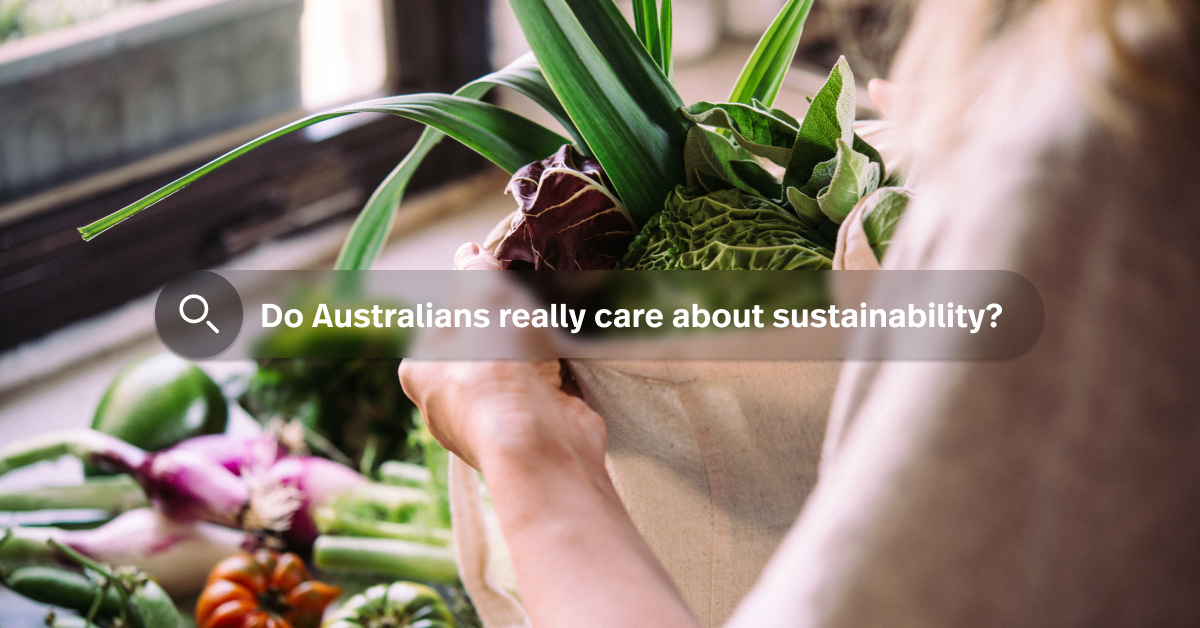
Sustainability and the impact of individual businesses on the environment have been hot topics in recent years. From deforestation to carbon emissions, food waste, unsustainable meat production and ocean plastics, the global focus on sustainability is now laser-sharp.
But do Australian consumers really care about sustainability?
In short, yes.
According to IBIS World, 87% of Australians are concerned about environmental issues and sustainability.
While the sustainability movement has witnessed significant traction in the last decade, consumers are now actively aligning their purchasing behaviours with sustainable and environmentally friendly practices, which will inevitably have a knock-on effect on businesses.
For those in the hospitality industry, it’s more important than ever to rethink operational strategies and invest in sustainable practices to avoid alienating a growing, sustainably-minded wave of consumers.
To help hospitality businesses stay ahead of the curve, we’ve analysed recent consumer trends and statistics to understand what eco-conscious customers really want and how their attitudes and behaviours are changing.
- Sustainability takes centre stage
- The war on food waste
- Plastic-free and paperless revolution
- Rise of vegetarian, flexitarian and plant-based diets
- How can your venue embrace sustainability?
- How has the industry adapted?
Sustainability takes centre stage
It’s no secret that sustainability is a pressing concern for society as a whole, and Australian consumers are taking note.
A recent survey found that 69% of Aussies either always consider sustainability or often consider sustainability in their purchasing decisions. By contrast, only 5% reported never taking sustainability into consideration.
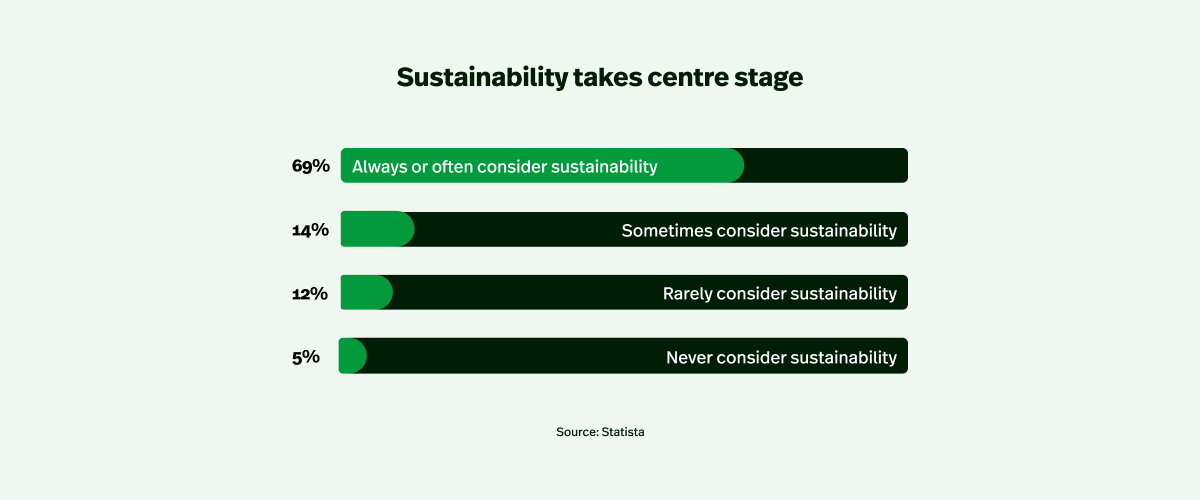
Not only are Australians actively considering sustainability when they make a purchase, but they’re also willing to pay extra for it.
A Nielsen study found that 66% of consumers are willing to pay more for sustainable products. The same study also found that younger generations are even more prepared to put their hand in their pockets to support sustainability, with 73% of millennials happy to pay more for sustainable goods.
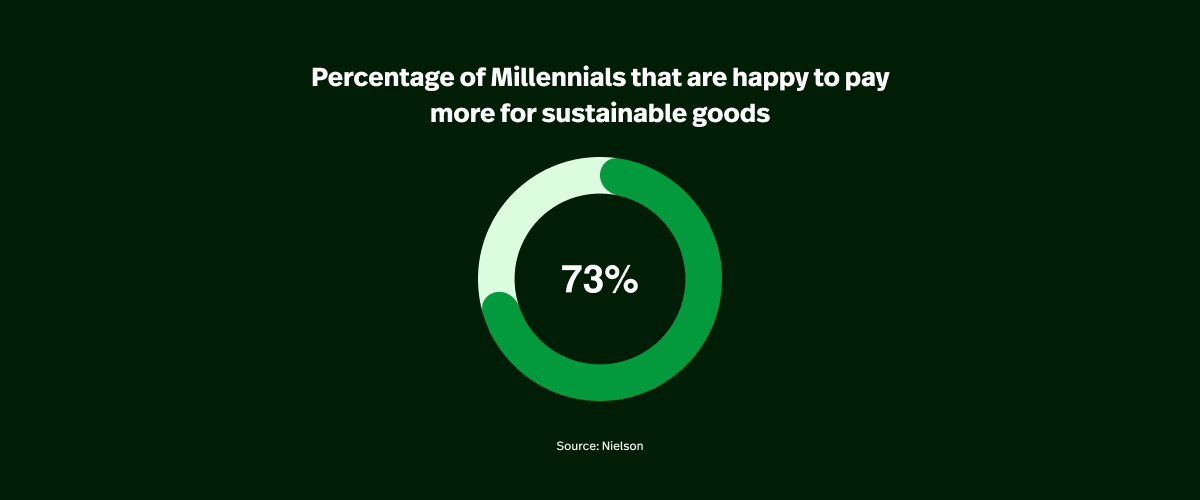
Sustainability: a closer look
While it’s clear that sustainability is a hot topic, the idea of sustainability can mean different things to different people – making it tricky for businesses to nail down exactly how to make positive changes.
In the broadest sense of the word, sustainability refers to the ability to maintain or support a process continuously over time. In more tangible terms, sustainability aims to prevent the depletion of natural or physical resources so that they will remain available for the long term.
The day-to-day reality
In day-to-day reality, this can take on several forms – from recycling plastic to reducing personal meat consumption, minimising your carbon footprint and being conscious of the amount of waste your household produces.
What about hospitality businesses?
Sustainability might look slightly different for hospitality businesses, but the end goal is the same. The aim is to support customers in their sustainability efforts whilst also taking steps to ensure your business operates more sustainably. This could include offering meat-free alternatives, going plastic-free, reducing kitchen waste or sourcing local ingredients.
With this in mind, let’s look at some of the most pressing sustainability issues facing the hospitality industry through the lens of an eco-conscious consumer.
The war on food waste
Food waste is inextricably linked to sustainability, and the topic has gained momentum in recent years as it’s a significant contributor to harmful greenhouse gas emissions and global warming.
Each year, Australians waste more than 7.6 million tonnes of food – 70% of which is edible, costing the economy over $36.6 billion annually.
Around 10% of global greenhouse gas emissions come from food waste. In Australia, this represents 17.5 million tonnes of CO2 each year.
Unfortunately, the hospitality industry isn’t an innocent bystander when it comes to food waste, and it’s estimated that the food retail and hospitality industry is responsible for one-third of Australia’s total food waste.
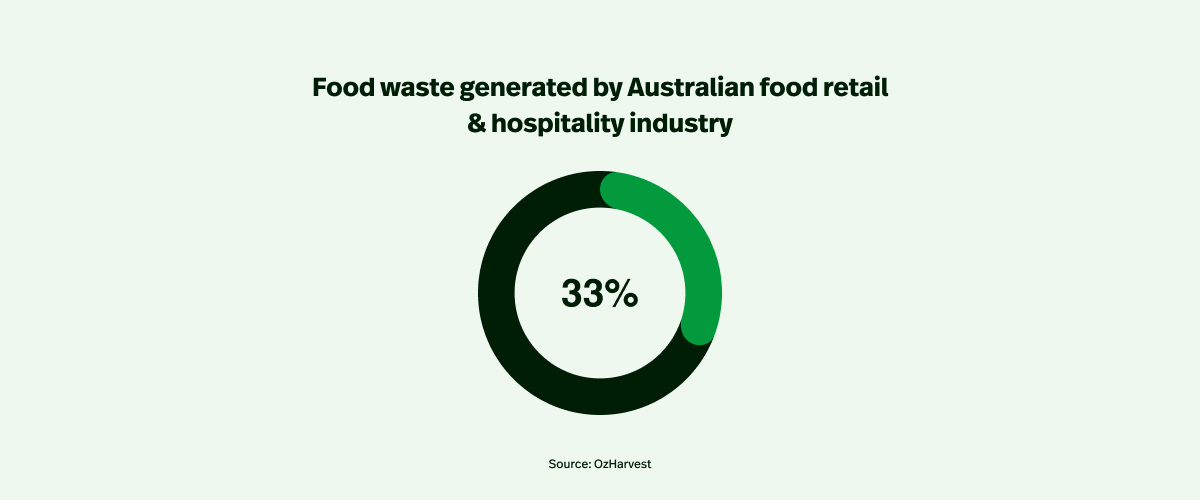
Plastic-free and paperless revolution
Paper and plastic waste is another pressing issue for many eco-conscious customers.
Paper waste, for example, accounts for 26% of total waste in landfills. Like food waste, paper waste is a huge global issue contributing to deforestation, greenhouse gas emissions and water pollution.
While you might not immediately associate restaurants with paper waste, venues actually produce a surprising amount – from paper dockets to customer receipts, takeout packaging and menus.
Like paper waste, plastic waste, particularly single-use plastic, is another contentious issue for consumers, with a 2023 Statista study finding that over one-third of Aussies want to minimise the use of single-use plastic.
Single-use plastic is a massive contributor to the plastic waste that litters the ocean, and it’s estimated that 44% of ocean plastic waste comprises takeout food and drink containers and utensils.
Unsurprisingly, consumers are increasingly conscious of their paper and plastic consumption habits, highlighting a clear opportunity for venues to reduce the amount of paper and plastic they consume and waste to appeal to this cohort.
Rise of vegetarian, flexitarian and plant-based diets
Plant-based, vegetarian and flexitarian diets are on the rise in Australia. Thanks to popular Netflix documentaries like Cowspiracy and Seaspiracy, consumers are increasingly conscious of their food and where the ingredients come from.
In fact, Australia was the second-most popular nation globally for vegans in 2023, behind only the UK, and 42% of Australians are either reducing the amount of meat they consume or are completely cutting it from their diet.
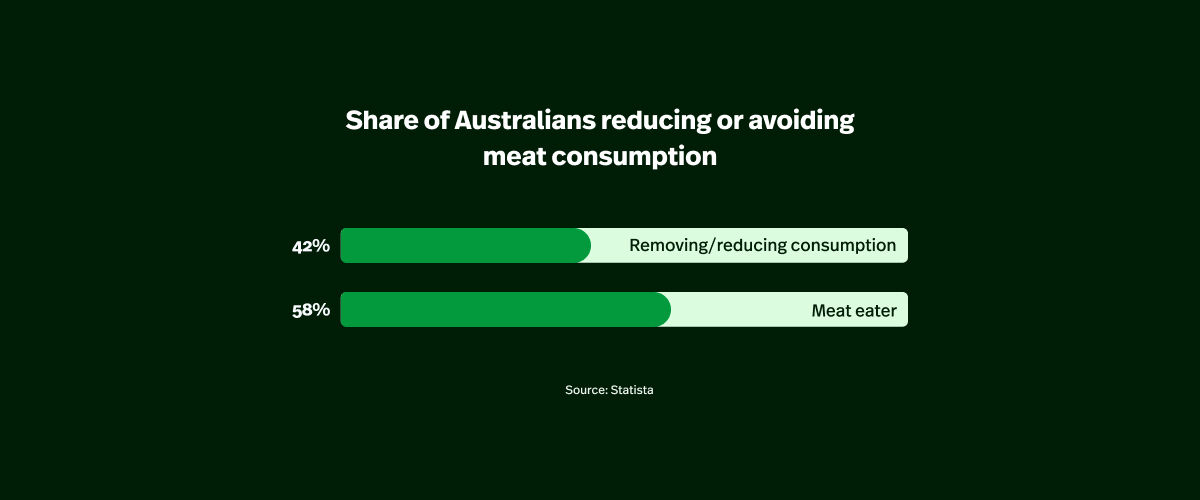
This trend is also reflected in the booming plant-based meat and meat alternatives industries. According to Statista, from 2018 to 2023, the meat substitutes market grew by 64%, and it’s projected to grow by a further 55% in the next five years.
This data points towards a considerable shift in eating habits and emphasises that plant-based eating is no longer just a fad that hospitality businesses can hope to ignore.
How can your venue embrace sustainability?
With a 2023 survey finding that only 2% of Aussies don’t view sustainability as a matter of personal importance, it’s clear that consumers are steadfast in their commitment to sustainability.
Like many other industries, the hospitality sector, as a whole, has a long way to go before it can fully embrace sustainability.
While adopting a sustainable business model isn’t going to happen overnight, there are several steps you can take to make your business more sustainable and appeal to the growing number of consumers who are looking to make more eco-conscious choices.
Cut down on food waste
It’s estimated that at least 40% of food bought for inventory never makes it past the back of the house, equating to thousands of dollars of lost revenue for businesses. However, a recent World Resources Institute report found that every dollar a restaurant spends to reduce food waste saves an average of seven dollars.
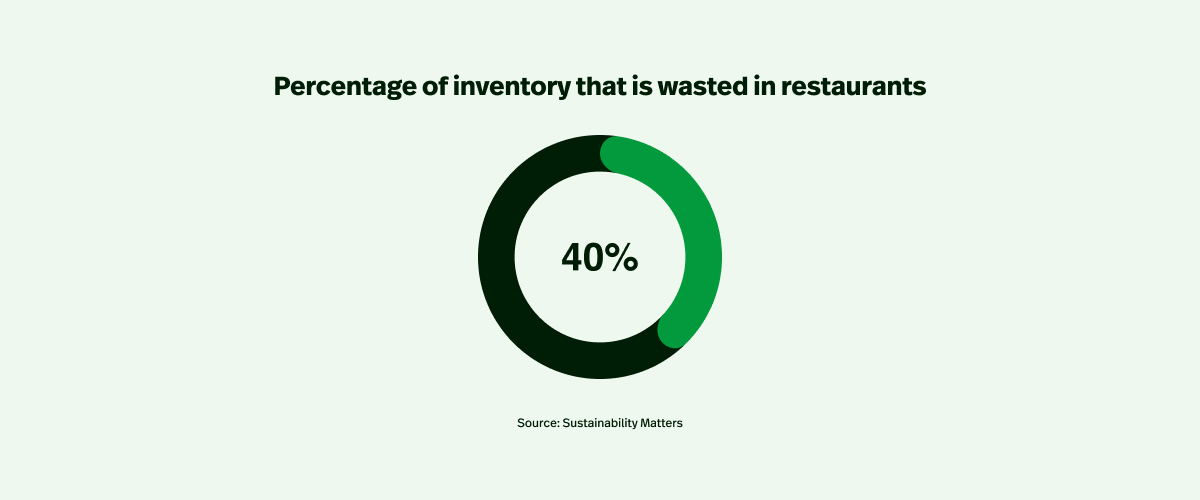
Reducing the amount of food waste your business produces is a great first step towards a more sustainable operating model – plus, you’ll appeal to eco-conscious consumers while also saving your business money.
Cutting down on the amount of food waste your venue generates will take time, but you can implement a few simple practices to steer your venue in the right direction.
- If you have regular leftovers, consider donating them to a local homeless shelter or charity like OzHarvest, which distributes the donated food to those in need. Not only does this support the local community, but it also highlights to customers that you’re proactively trying to reduce the amount of food your business wastes.
- Many venues also employ smart inventory management technology to keep on top of their inventory. These tools make it easy for venues to see what stock they have on hand at all times, minimising the risk of over-ordering, which can result in spoilt ingredients and wasted dollars.
- Audit your menu to minimise the amount of food waste going from a customer’s plate into your kitchen bin. If you notice customers are often unable to finish a certain dish, consider tweaking the portion size so less food is left on the plate. Similarly, if some of your dishes come with a small salad or side veggies that usually remain untouched – test removing them from the dish completely to minimise waste.
Reduce paper waste
While recycling paper waste is a great first step, there’s a lot more that hospitality businesses can do to reduce their paper consumption in the first place.
- With 90% of paper receipts ending up in the bin, offering a digital alternative is an easy way to reduce the amount of paper your venue wastes while highlighting to customers that you care about sustainability.
- The same goes for order dockets. Bump screens are a great alternative to traditional kitchen printers as they eliminate the need for printer paper. Plus, bump screens are environmentally friendly and make it easier for kitchen staff to stay organised, ensuring back-of-house operations run smoothly.
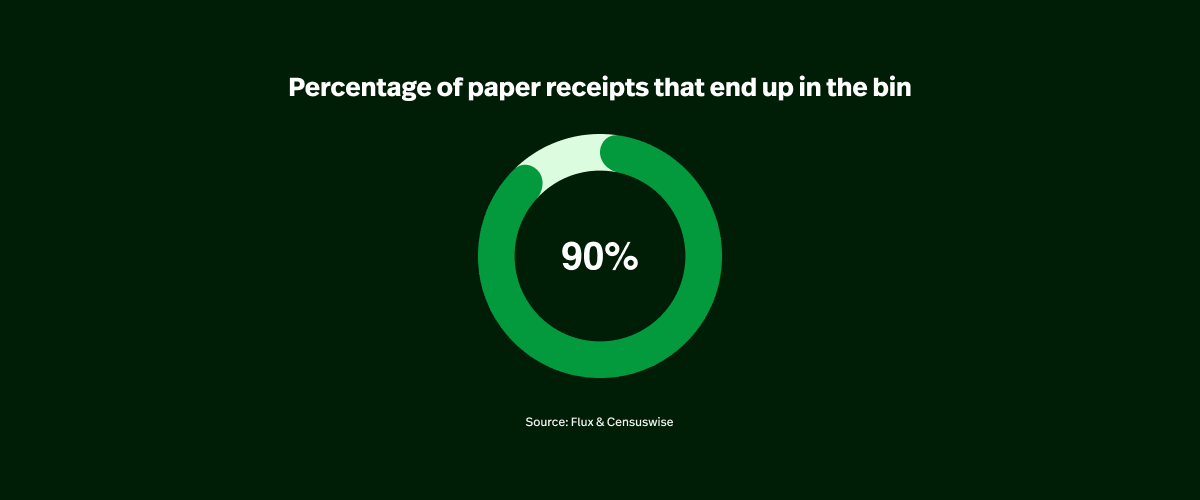
Go plastic-free
A recent Statista study found that nearly half of Aussies believe if a product is recyclable or biodegradable, then it is sustainable, and just over a third indicated that if a product uses minimal packaging, then it is also sustainable.
While some plastic is recyclable, it’s not biodegradable and is increasingly viewed in a negative light by consumers. Therefore, positioning yourself as a plastic-free venue is a great way to emphasise your commitment to sustainability to your customers.
- Replace plastic straws with environmentally friendly paper ones and avoid giving away plastic cutlery or packaging if you offer takeaway.
- If you regularly purchase plastic lids for takeaway cups, incentivise your customers to use environmentally friendly, reusable cups instead. For example, you could provide a small 50-cent discount on any drink purchased by a customer who uses their own cup.
Not only are consumers advocating for a reduction in single-use plastic, but so are state governments. For example, many businesses in NSW have already had to reduce the types of single-use plastics they can use in their venues.
Since 2021, the NSW ban on single-use plastics has meant businesses are banned from using single-use plastic bags, straws, stirrers, cutlery, plates, bowls, and more.
Remember: A 2023 survey found that just over 25% of Australian consumers believe the main barrier to adopting a more sustainable lifestyle is a lack of information about whether a product or service is sustainable.
So, if your business is taking steps to reduce its plastic waste (or any other sustainability initiative) – don’t be shy and share this news with your customers – either on your website, social media channels or in your venue.
Include plant-based menu items
With more Aussies taking a keen interest in what they eat and where their food comes from, hospitality venues need to fine-tune their offerings to appeal to this fast-growing market of conscious consumers.
Excluding plant-based options from your menu will likely mean you’ll miss out on potential sales from customers who otherwise would have come to your venue. Therefore, adapting your offering is crucial to ensure your menu appeals to a broader range of consumers.
- Rather than including one token vegan dish, consider adding a range of vegan and vegetarian-friendly options to your menu. As most cafes and restaurants still only offer a single vegetarian or vegan option, adding an extra two or three dishes will immediately broaden your appeal and set your venue apart from the competition.
- Don’t forget the drinks! Many varieties of wine and beer aren’t suitable for vegans. If you serve alcohol, consider incorporating vegan-friendly wine and beer into your menu. And, if you serve cocktails, highlight which ones are suitable for vegans to help make their decisions easier.
Offer substitutes
Depending on the style of venue and type of cuisine, it’s not always possible (or practical) to add vegan or vegetarian-friendly dishes to a menu.
- Consider offering substitutes instead. For example, pasta dishes or salads containing meat or fish can be made vegetarian by swapping the meat for tofu or cheese.
- If you don’t want to offer substitutes, simply give people the option to request certain dishes without the meat where possible.
While this shouldn’t majorly disrupt your existing operations, you’ll open your venue up to a broader range of customers by accommodating their needs.
Minimise your carbon footprint
For businesses, reducing your carbon footprint is a great way to appeal to eco-conscious consumers.
- Over half of the electricity used by restaurants comes from cooking and refrigeration. Therefore, investing in new energy-efficient equipment is an effective way to reduce your energy waste and lower your utility bills.
- The same goes for lighting. Lighting accounts for 6% of CO2 emissions, and switching to LED lighting can reduce your carbon footprint and electricity costs.
- Sourcing locally produced products will minimise the time your ingredients spend on a plane or truck, so your venue gains fresher produce and is responsible for fewer carbon emissions. Plus, purchasing local produce helps support your local economy and is instrumental in fostering long-term connections to support other local businesses while also helping the environment.
How has the industry adapted?
With over one-third of Australians strongly believing that businesses bear a responsibility to consumers to operate sustainably, many big players in the industry have started to tweak their offerings to align with eco-conscious consumers.
Prioritising plant-based
Just a few short years ago, vegans and vegetarians struggled to find any options, other than fries, at the mainstream fast food joints in Australia. Fast forward a couple of years and the majority of fast-food chains have their own dedicated plant-based menus.
Fast-food giants Hungry Jacks and Dominos have added expansive vegetarian and vegan options to their menus, emphasising how plant-based diets are now part and parcel of mainstream culture.
In addition to this, Mr.Charlies, the fast-growing vegan and vegetarian fast-food chain, has just opened its first venue outside of the United States in Sydney. Mr.Charlie’s is breaking the boundaries of what fast food encompasses, aiming to bridge the gap between sustainability and a quick bite to eat. In their own words:
“Mr.Charlie’s mission is to bring approachable plant-based food, fun & support to communities.
We are tackling serious issues with a not-so-serious approach. We are about having a good time and paying it forward. Our goal is to offer more sustainable choices, connect mindfulness to everyday living, & support those who are ready for a second chance.”
Zero waste movement
The zero waste movement has gained momentum, and a handful of hospitality venues across the globe have achieved the lofty, sustainable goal of generating zero or minimal waste.
In Australia, Sydney-based RE is one of the first zero-waste cocktail bars in the world. From benchtops made with recycled milk bottles to making syrups with banana skins and surplus fruit, RE aims to be 100% waste-free and build a blueprint for how bars can operate sustainably in the future.
In the UK, Lightspeed customer Silo is the world’s first zero-waste restaurant and operates without a kitchen bin. The team at Silo sources ingredients directly from farmers and producers and upcycles or composts all excess waste, making the need for a kitchen bin redundant.
Douglas McMaster, owner of Silo, comments:
“We are the world’s first zero-waste restaurant and aim to innovate the food industry whilst demonstrating respect: respect for the environment, respect for the way food is generated and respect for the nourishment we give to our bodies.”
The time for change is now
With more people taking a close interest in sustainability, what they eat, where their food comes from, and unnecessary waste, hospitality venues must adapt their operations and offerings to meet changing consumer demands.
Consumer trends and recent data show a clear shift in customer preferences regarding sustainability, and many big players in the industry are already starting to tweak their offerings to appeal to eco-conscious consumers.
To stay ahead of the curve, now is the perfect time for venues to actively make sustainable changes and show customers that you’re one step ahead of the sustainability movement rather than missing the boat and scrambling to play catch up in a few years.

News you care about. Tips you can use.
Everything your business needs to grow, delivered straight to your inbox.


